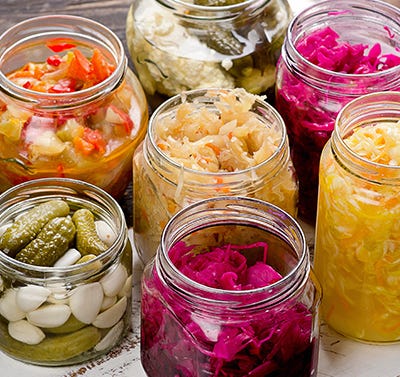How to support your gut for clear skin

We all aspire to have a clear, flawless complexion and can sometimes be hard on ourselves for not having it. We can also be guilty of picking and squeezing our spots which may contribute to scarring.
To help your journey to a clear, radiant appearance, our team at the research centre have shared their evidence-based recommendations. But before we dive in, with five tips let’s look at how the gut can impact the skin and other nutritional advice.
Unhappy gut
Having an unhealthy microbiome is an imbalance between good and bad bacteria, which can cause problem or stressed skin. The factors that can contribute to this are:
S - stress, sugar, sleep problems
A - alcohol, antibiotics, ageing
D - diet (too much sugar and fast foods)
It’s important to nurture the connection between the gut and the skin as an imbalance of good and bad bacteria can negatively impact skin function ¹. Fortunately, there are various things we can do to support a healthy gut flora.
Tip 1: Eat fermented foods
Fermented foods are rich in beneficial bacteria and help support better digestion. Examples of fermented foods are ²:
Miso - a common seasoning in Japanese culture. It can be found in miso soup, and can be added to vegetables, salads, and even marinated meat for extra flavour.
Kimchi - is found in many Korean side dishes from fermented cabbage or vegetables such as radishes.
Sauerkraut - is a condiment consisting of fermented cabbage. You can add in casseroles, soups, and sandwiches.
Probiotic yoghurt – is produced from milk that has been fermented with lactic acid bacteria. You should look to include some of these foods in your weekly diet.
Tip 2: Manage stress levels
Evidence shows that stress can impact your internal microbiome and it can potentially make your acne slower to heal ³. There are various activities you can do to help manage stress, including increasing exercise, practicing yoga, meditation and spending time with friends and family. Check online for resources or your local area for activities in your community.
Tip 3: Eat more omega-3 fatty acids
Research suggests that omega-3 fatty acids can have a positive impact on gut bacteria.⁴ You can consume these from ⁵: Salmon Sardines Mackerel Anchovies Sardines Hearing Almonds Chia seeds
Tip 4: Avoid a high glycaemic diet
You should avoid foods that are high glycaemic. A glycaemic diet considers the quantity of carbohydrates consumed as well as the rate of carbohydrate absorption. Sugar, white bread, and white rice are all carbohydrates rapidly absorbed, leading to higher serum glucose levels and increased levels of insulin. Insulin has been shown to increase sebum production which can contribute to spots⁶. To balance blood sugar levels, our skin researchers recommend eating green vegetables, carrots, kidney beans, chickpeas, and lentils ⁷. In a ten-week study where participants went on a low glycaemic diet, their acne had improved, and an examination of skin samples revealed decreased inflammation ⁸.
Tip 5: Sleep 7-8 hours a day
Not getting the sufficient quantity or quality sleep can have a serious impact on your gut as it can alter the microbiome diversity.⁹ You should prioritise getting at least 7-8 hours of uninterrupted sleep per night ¹⁰
. With these factors in mind, you can see how important it is to support your gut flora and how it can influence your skin. Incorporating these healthy habits into your lifestyle are going to help your journey to clear skin confidence and achieve vibrant, radiant ski
1. The Gut Microbiome as a Major Regulator of the Gut-Skin Axis. July 2018.
2. 8 fermented foods to boost digestion and health, Health Line.
3. The relationship between stress and acne. Health Line.
4. Impact of Omega-3 Fatty Acids on the Gut Microbiota. National Library of Medicine.
5. 12 foods that are very high in omega 3 Health Line.
6. Smith, R. N., et al (2007). The effect of a high-protein, low glycemic-load diet versus a conventional, high glycemic-load diet on biochemical parameters associated with acne vulgaris: a randomized, investigator-masked, controlled trial. Journal of the American Academy of Dermatology, 57(2), 247–256.
7. Nutrition and healthy eating. Mayo Clinic. August 2020.
8. Kwon, H. et al. (2012). Clinical and histological effect of a low glycaemic load diet in treatment of acne vulgaris in Korean patients: a randomized, controlled trial. Acta Dermato-Venereologica, 92(3), 241–246.
9. Gut microbiome diversity is associated with sleep physiology in humans. October 2019.
10. What’s an unhealthy gut? How gut health affects you. Health Line.
